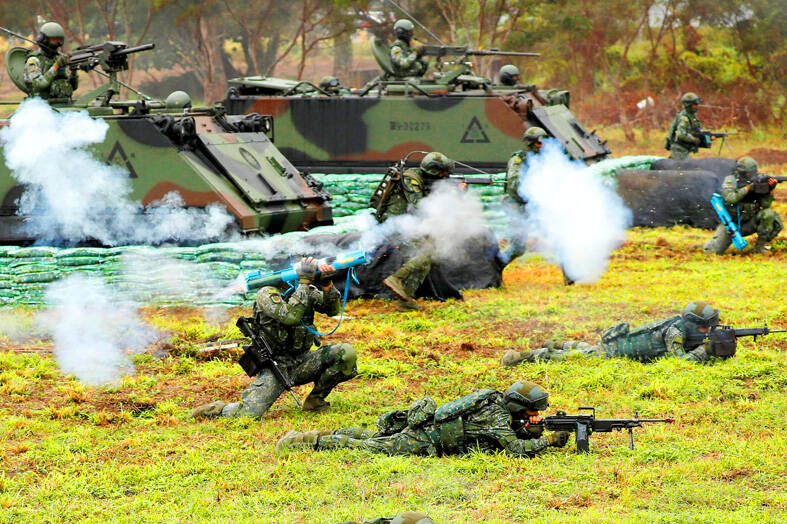President Tsai Ing-wen (蔡英文) is expected to call a high-level national security meeting on Tuesday during which she would order the expansion of conscription from four months to one year, a source familiar with the matter said.
On Dec. 7, Minister of National Defense Chiu Kuo-cheng (邱國正) told lawmakers that a decision on the length of military service would be announced before the end of the year.
With one week left before New Year’s Eve, the only option remaining for the Tsai administration to prolong conscription is through an executive order — an avenue that the government is willing to take, the source said, speaking on condition of anonymity.

Photo: Tyrone Siu, REUTERS
Assuming the order is promulgated on Saturday, the implementation of the policy would begin no earlier than Jan. 1 and affect conscripts born in 2006, they said.
Military-aged men performing alternative civil service would also have their service terms extended to a year, up from six months, the source said.
The salary for military conscripts is to be increased to NT$15,000 per month, they added.
Leading Democratic Progressive Party lawmakers in the party’s caucus and the legislature’s Foreign Affairs and National Defense Committee have been briefed on these developments by the Presidential Office and the Ministry of National Defense, the source said.
Tsai is expected to personally announce the change and leave it to the Executive Yuan to finalize the policies, while the Legislative Yuan would receive a notification as soon as Friday, they said.
As the legislature is extending its current session to Jan. 13, there should be enough time for lawmakers to take receipt of the executive order, the source said.
A decline in population and the rising threat posed by China means Taiwan must fall back on conscription to have the necessary number of troops to defend itself, the Central News Agency cited an internal report by the ministry as saying.
Although a professional military comprised of five-year volunteers would be the most efficient force, such goals could be unobtainable due to the nation’s changing demographics and China’s increasingly formidable amphibious capabilities, the report said.
The military recruited 70,495 volunteers from 2016 to last year, which was equivalent to enlisting 0.3 percent of the population each year, matching the enlistment rates in other democracies, it said.
While Taiwan could before 2016 draw volunteers from a pool of about 110,000 military-aged males per year, the number of men available to the military has declined every year since 2019, it said.
By 2025, the military would not be able to recruit more than 9,305 new volunteers, a decrease of 4,709 compared with the current levels and insufficient for meeting national defense needs, it said.

INVESTIGATION: The case is the latest instance of a DPP figure being implicated in an espionage network accused of allegedly leaking information to Chinese intelligence Democratic Progressive Party (DPP) member Ho Jen-chieh (何仁傑) was detained and held incommunicado yesterday on suspicion of spying for China during his tenure as assistant to then-minister of foreign affairs Joseph Wu (吳釗燮). The Taipei District Prosecutors’ Office said Ho was implicated during its investigation into alleged spying activities by former Presidential Office consultant Wu Shang-yu (吳尚雨). Prosecutors said there is reason to believe Ho breached the National Security Act (國家安全法) by leaking classified Ministry of Foreign Affairs information to Chinese intelligence. Following interrogation, prosecutors petitioned the Taipei District Court to detain Ho, citing concerns over potential collusion or tampering of evidence. The

Seventy percent of middle and elementary schools now conduct English classes entirely in English, the Ministry of Education said, as it encourages schools nationwide to adopt this practice Minister of Education (MOE) Cheng Ying-yao (鄭英耀) is scheduled to present a report on the government’s bilingual education policy to the Legislative Yuan’s Education and Culture Committee today. The report would outline strategies aimed at expanding access to education, reducing regional disparities and improving talent cultivation. Implementation of bilingual education policies has varied across local governments, occasionally drawing public criticism. For example, some schools have required teachers of non-English subjects to pass English proficiency

‘FORM OF PROTEST’: The German Institute Taipei said it was ‘shocked’ to see Nazi symbolism used in connection with political aims as it condemned the incident Sung Chien-liang (宋建樑), who led efforts to recall Democratic Progressive Party (DPP) Legislator Lee Kun-cheng (李坤城), was released on bail of NT$80,000 yesterday amid an outcry over a Nazi armband he wore to questioning the night before. Sung arrived at the New Taipei City District Prosecutors’ Office for questioning in a recall petition forgery case on Tuesday night wearing a red armband bearing a swastika, carrying a copy of Adolf Hitler’s Mein Kampf and giving a Nazi salute. Sung left the building at 1:15am without the armband and apparently covering the book with a coat. This is a serious international scandal and Chinese

TRADE: The premier pledged safeguards on ‘Made in Taiwan’ labeling, anti-dumping measures and stricter export controls to strengthen its position in trade talks Products labeled “made in Taiwan” must be genuinely made in Taiwan, Premier Cho Jung-tai (卓榮泰) said yesterday, vowing to enforce strict safeguards against “origin laundering” and initiate anti-dumping investigations to prevent China dumping its products in Taiwan. Cho made the remarks in a discussion session with representatives from industries in Kaohsiung. In response to the US government’s recent announcement of “reciprocal” tariffs on its trading partners, President William Lai (賴清德) and Cho last week began a series of consultations with industry leaders nationwide to gather feedback and address concerns. Taiwanese and US officials held a videoconference on Friday evening to discuss the